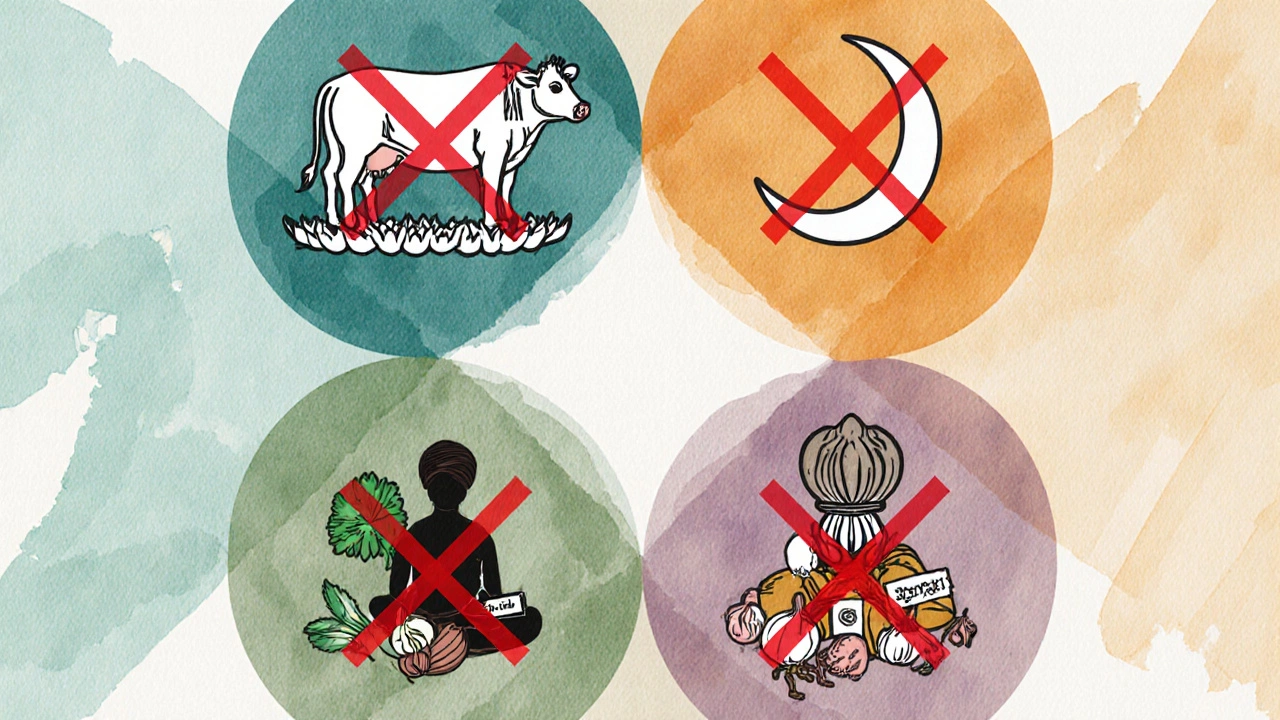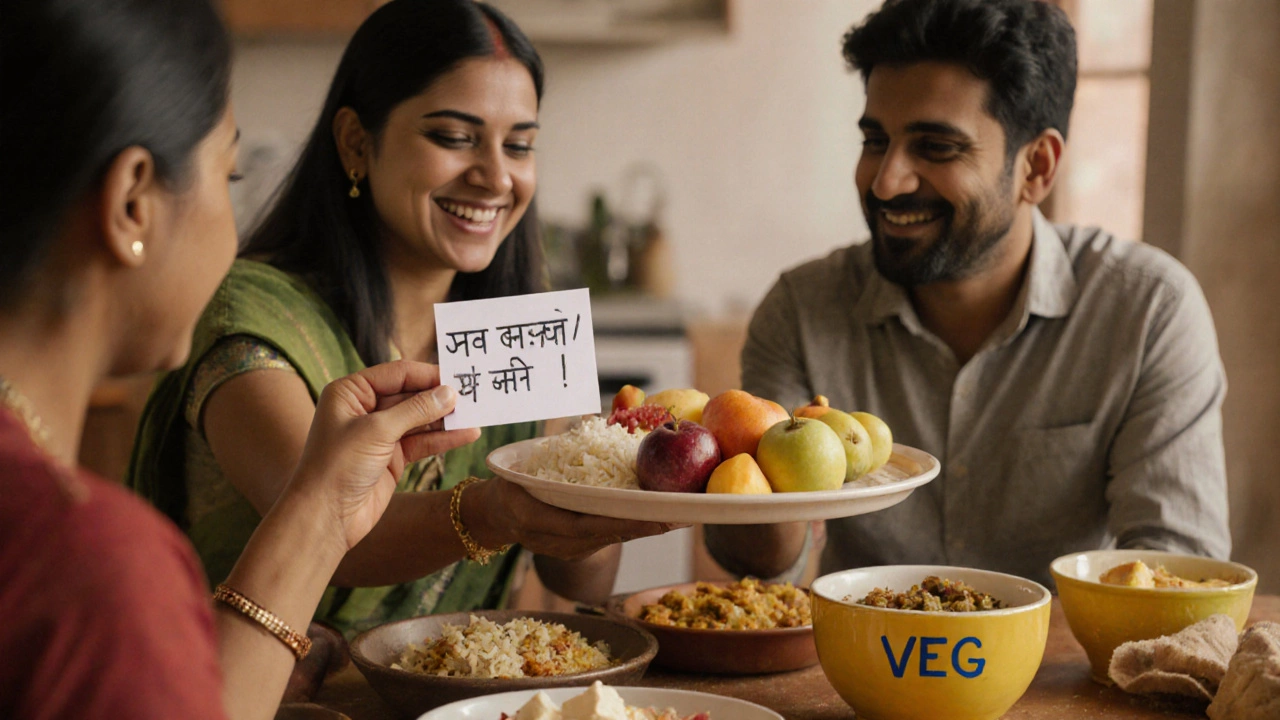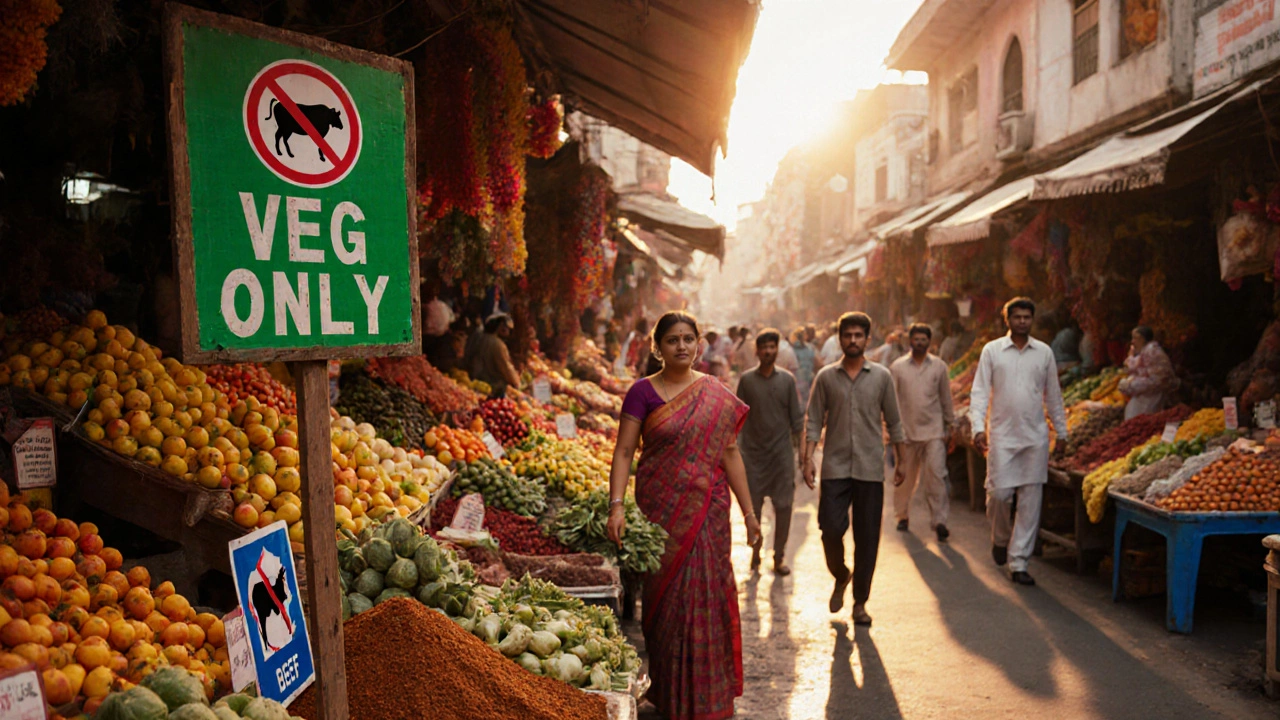Indian Food Taboo Checker
Check Your Food Compatibility
Select your situation to see what foods are acceptable according to Indian religious and regional customs.
Select your situation and click "Check Compatibility" to see food recommendations.
Traveling through India can feel like stepping into a giant kitchen where every dish tells a story - but not every story is meant to be shared at the dinner table. Knowing the Indian food taboos can keep you from an awkward moment, a hurt feeling, or even a legal issue. Below is a practical guide that breaks down the most common food prohibitions, why they exist, and how you can respect them without missing out on the flavors you came for.
What makes food taboos so powerful in India?
Food in India isn’t just fuel; it’s a cultural signpost. From ancient scriptures to modern laws, what you can or cannot eat is linked to religion, caste, health philosophies, and regional identity. A simple act like refusing beef can signal respect for Hindu beliefs, while avoiding pork respects Muslim customs. Understanding these cues helps you navigate social gatherings, street stalls, and even government regulations.
Religious foundations of Indian food taboos
Four major faiths shape the country’s dietary landscape. Each has a distinct set of prohibitions that often overlap but also differ dramatically.
- Hinduism is the oldest and most widespread religion in India, emphasizing ahimsa (non‑violence) and purity in food. Hindus generally avoid beef because the cow is considered sacred. Many also abstain from meat on specific fasting days, and some sects (like Vaishnavites) avoid all meat, fish, and eggs.
- Islam is the second‑largest religion in India, guiding followers with Qur'anic law (halal) on permissible foods. Muslims do not eat pork or pork products, and they must ensure meat is slaughtered according to halal standards. Alcohol is also discouraged, especially during Ramadan.
- Jainism is a strict ascetic tradition that practices extreme non‑violence, extending even to microorganisms. Jains are vegetarians who also avoid root vegetables (like onions, garlic, potatoes) because harvesting kills the plant. They do not consume honey, dairy from harmed animals, or any fermented foods.
- Sikhism is a monotheistic faith that encourages a simple, honest lifestyle and rejects ritualistic restrictions. Sikhs avoid halal or kosher meat because the religious rituals behind those slaughters conflict with their belief in equality. They also steer clear of alcohol and tobacco.
Regional twists on food prohibitions
India’s 28 states add another layer of nuance. Here’s a quick look at how geography influences what’s off‑limits.
- Punjab (North): Beef is illegal in Punjab, and many families follow vegetarian days during festivals like Vaisakhi.
- Gujarat (West): A strong vegetarian culture dominates, and many restaurants refuse to serve meat at all, even for tourists.
- Kerala (South): While Hindus often avoid beef, the state’s large Christian and Muslim populations make pork and beef widely available. However, many Brahmin families still observe strict vegetarianism.
- West Bengal (East): Fish is a staple, but Muslims in the region avoid pork, and Hindus often abstain from beef, especially during Durga Puja.
Common foods that are often taboo
Below is a concise rundown of the items that most travelers find surprising.
- Beef is widely prohibited among Hindus and illegal in several states. Even in areas where it’s legally sold, you may encounter resistance if you order it openly.
- Pork is restricted for Muslims and some Hindu communities, especially in northern India.
- Onion and garlic are avoided by many Jains and some Hindu devotees during fasting periods.
- Alcohol is generally discouraged in Muslim households and during religious festivals like Navratri.
- Honey is excluded by strict Jains who avoid any animal exploitation.
- Fermented foods (e.g., idli batter left overnight) can be avoided by some Jains who consider them potentially harming microorganisms.

Fasting periods and special taboos
Many festivals dictate temporary dietary changes. Knowing when these occur helps you respect host families and avoid unintentionally breaking a fast.
- Ramadan (Islam): Muslims fast from sunrise to sunset. Eating, drinking, or even chewing gum in public during daylight can be offensive.
- Navratri (Hinduism): Six days of fasting often mean avoiding grains, onions, and garlic; many eat only fruits, nuts, and dairy.
- Ekadashi (Hinduism): A bi‑monthly fast that restricts grains and beans; many opt for fruits, nuts, and milk.
- Mahavir Jayanti (Jainism): Jains observe a strict vegetarian fast, often also avoiding root vegetables.
Practical tips for travelers and expats
Here’s a quick cheat‑sheet you can keep on your phone when you’re ordering food or joining a home meal.
- Ask politely: “Is this dish vegetarian/vegan/Halal?” Most hosts appreciate the respect.
- When in doubt, choose dishes labeled “veg” or “Paneer” in restaurants; these are safe for most Hindus and Jains (except strict Jains who avoid dairy from harmed animals).
- Carry a small card with the phrase “I do not eat beef/pork/onion/garlic” in the local language (Hindi: "मैं गाए/सुअर/प्याज़/लहसुन नहीं खाता/खाती").
- Respect fasting hours: if you’re in a Muslim‑majority area during Ramadan, refrain from eating in public spaces after sunset.
- When invited to a home, bring a modest gift like fruits or sweets; avoid bringing meat or alcohol unless you’re certain the host consumes them.
Quick reference table: Religious food taboos
| Religion | Forbidden Foods | Core Reason |
|---|---|---|
| Hinduism | Beef, certain meats on fasting days | Holy status of cow, purity during rituals |
| Islam | Pork, non‑halal meat, alcohol | Qur'anic law (halal) and health considerations |
| Jainism | All meat, eggs, honey, root vegetables, fermented foods | Strict ahimsa (non‑violence) towards all life forms |
| Sikhism | Halal/kosher meat, alcohol, tobacco | Equality and rejection of ritual sacrifice |

Common misconceptions clarified
Many visitors think “everyone in India is vegetarian.” That’s a myth. While a large portion of the population follows a vegetarian diet, especially in Gujarat and parts of South India, meat consumption is common among Muslims, Christians, and many Hindus in regions like Bengal and Kerala. Another false belief is that all Indians avoid all onions and garlic. Only certain sects (Jains, specific Hindu fasting days) do, while most people enjoy them daily.
What to do if you accidentally offend
If you serve yourself a piece of beef at a Hindu gathering, stay calm. Apologize sincerely, explain it was an honest mistake, and offer to replace the dish. Most hosts will appreciate the humility and move on. The same goes for accidentally drinking alcohol in a Muslim home; a quick “I’m sorry, I didn’t realize” usually smooths things out.
Frequently Asked Questions
Is it legal to eat beef anywhere in India?
No. While some states like Kerala and Goa allow beef sales, others such as Gujarat, Madhya Pradesh, and Karnataka have strict bans. Even in states where it is legal, many restaurants and households avoid serving beef out of respect for Hindu sentiments.
Can I ask a restaurant if a dish is halal?
Absolutely. Most Muslim‑run eateries label their menu items as “Halal.” If it’s not clear, a polite question like “Is this chicken prepared according to halal standards?” is perfectly acceptable.
Do Jains eat dairy?
Many Jains consume dairy, but strict Jains avoid any product that involves animal exploitation, including milk from cows that are routinely impregnated or milked. Some choose plant‑based alternatives instead.
What should I do during Ramadan if I’m not Muslim?
If you’re in a public place during daylight, avoid eating or drinking visibly. Many restaurants offer “Iftar” menus after sunset, which you’re welcome to join. Showing respect by not eating in front of those who are fasting is considered good etiquette.
Are there any foods universally accepted across India?
Fruit, fresh vegetables, nuts, and dairy (for most) are widely accepted. Simple dishes like dal (lentils) and rice are also safe choices in most settings, provided you check for hidden animal products or alcohol in the preparation.
